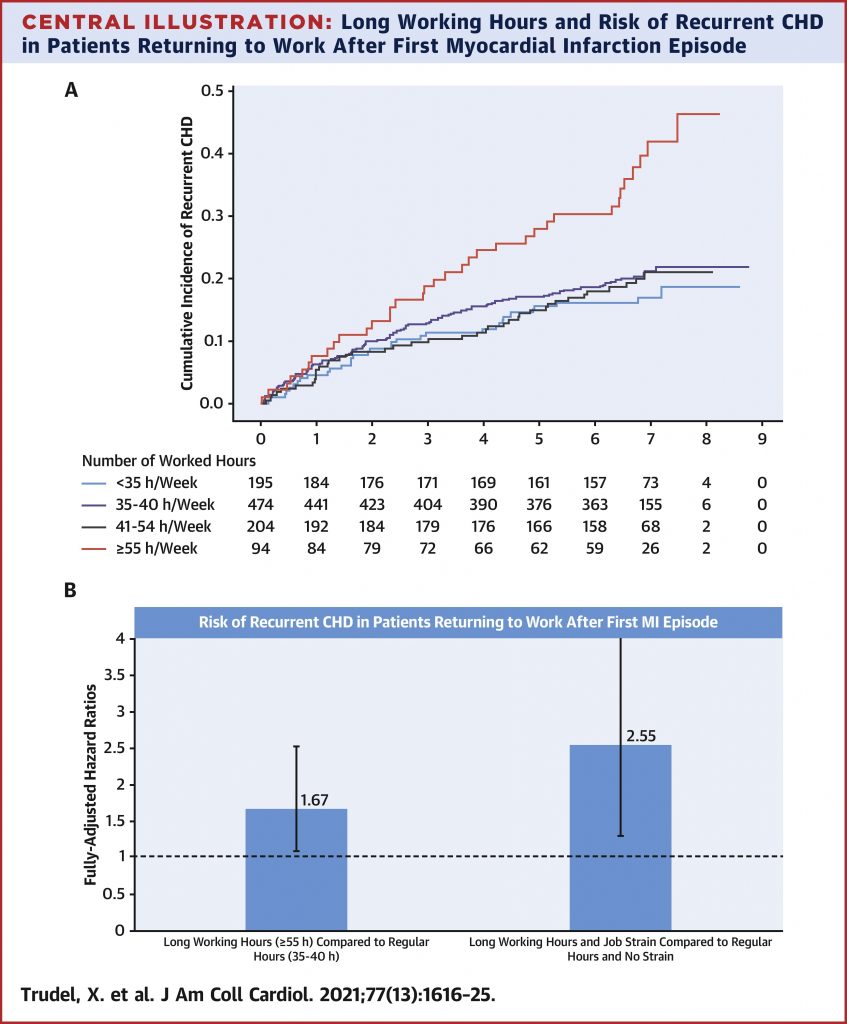Long working hours and the risk of recurrent coronary heart disease events
Xavier Trudel, PhDa, Chantal Brisson, PhDa, Denis Talbot, PhDa, Mahée Gilbert-Ouimet, PhDb, Alain Milot, MDc
a Laval University, Social and Preventive Medicine Department, 1050 avenue de la Médecine Université Laval Québec (Québec) G1V 0A6. Researcher, CHU de Québec-Laval University Research Centre, Quebec City, Québec, Canada.
b Department of Health Sciences, Université du Québec à Rimouski, Lévis, Quebec, Canada. Researcher, CHU de Québec-Laval University Research Centre, Quebec City, Québec, Canada.
c Laval University, Medicine Department, 1050 avenue de la Médecine Université Laval Québec (Québec) G1V 0A6. Researcher, CHU de Québec-Laval University Research Centre, Quebec City, Québec, Canada.

Abstract
Background: Evidence from prospective studies has suggested that long working hours are associated with incident coronary heart disease events (CHD). However, no previous study has examined whether long working hours are associated with an increased risk of recurrent CHD events among patients returning to work after a first myocardial infarction (MI).
Objective: To examine the effect of long working hours on the risk of recurrent CHD events.
Methods: This is a prospective cohort study of 967 men and women aged 35 to 59 who returned to work after a first MI. Patients were recruited from 30 hospitals across the province of Quebec, Canada. The mean follow-up duration was 5.9 years. Long working hours were assessed on average 6 weeks after their return to work. Incident CHD events (fatal or non-fatal MI and unstable angina) occurring during follow-up were determined using patients’ medical files. Hazard ratios were estimated using Cox proportional hazard regression models. Splines and fractional polynomial regressions were used for flexible exposure and time modelling.
Results: Recurrent CHD events occurred among 205 patients. Participants working long hours (≥55 h/week) had a higher risk of recurrent CHD events after controlling for sociodemographics, lifestyle-related risk factors, clinical risk factors, work environment factors and personality factors (hazard ratio vs. 35 to 40 h/week: 1.67; 95% confidence interval: 1.10 to 2.53). These results showed a linear risk increase after 40 h/week and a stronger effect after the first 4 years of follow-up and when long working hours are combined with job strain.
Conclusion: Among patients returning to work after a first MI, longer working hours per week is associated with an increased risk of recurrent CHD events. Secondary prevention interventions aiming to reduce the number of working hours among these patients may lower the risk of CHD recurrence.
